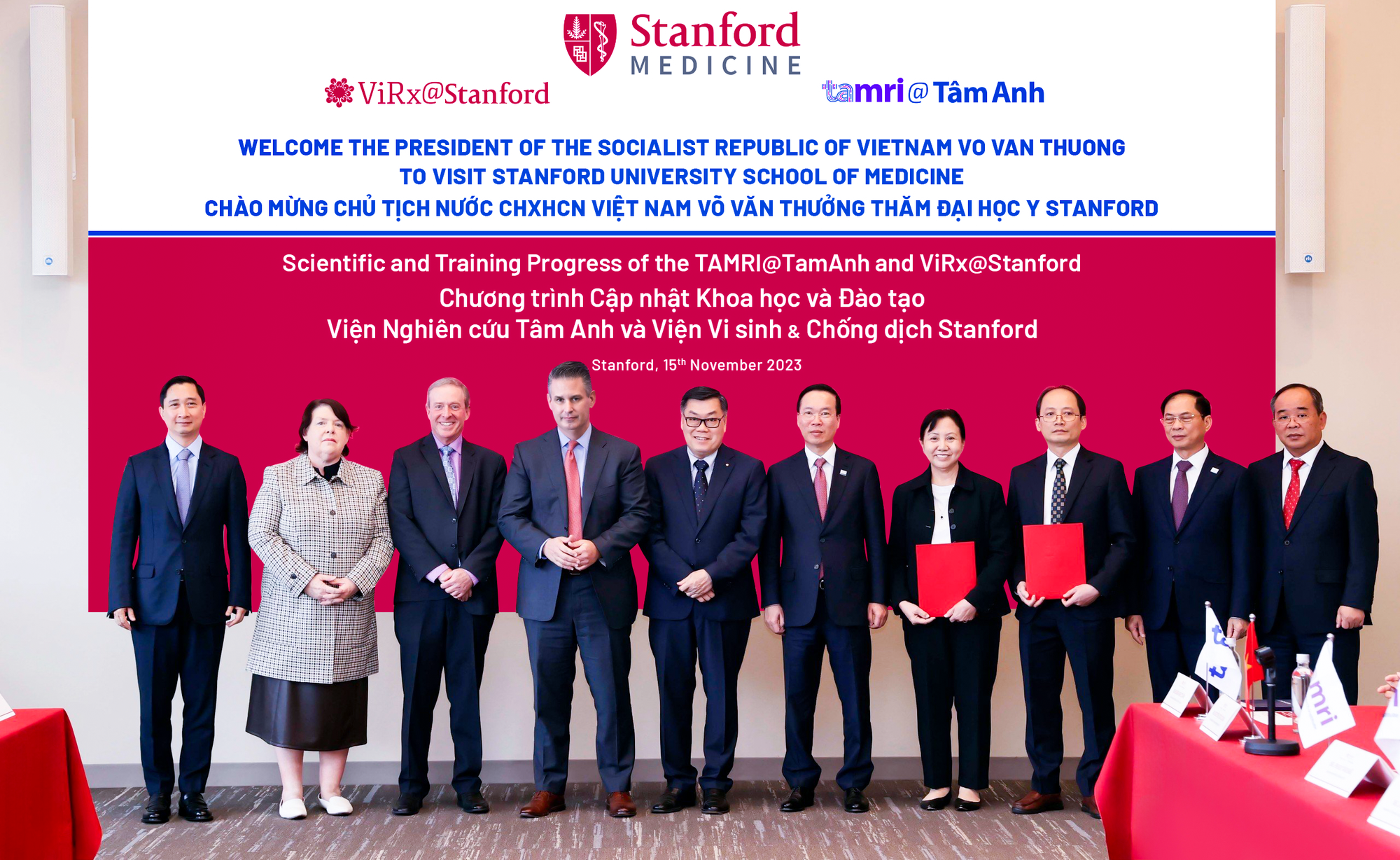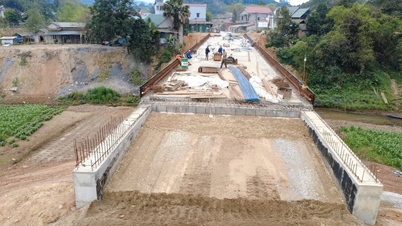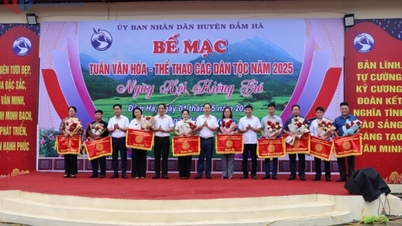This is one of the events taking place before President Vo Van Thuong officially attends the APEC 2023 Conference. Speaking at the ceremony, President Vo Van Thuong emphasized: "As we know, last September, Vietnam and the US announced the upgrading of their relationship to a comprehensive strategic partnership. Among the commitments, an important content is coordination in the field of medicine and human health care. And as we know, all high-level agreements only become reality with the close cooperation of localities, units and businesses."
The signing event yesterday between Tam Anh Research Institute, Vietnam and ViRx@Stanford, USA is the realization of important strategic goals to move towards medium and specific achievements in the field of medicine and health care that were set by the two Institutes in the agreement signed in September, within the framework of President Joe Biden's visit to Vietnam. These are 4 goals: promoting cooperation in training, research and development of biotechnology; researching and developing drugs to prevent and treat diseases; applying artificial intelligence (AI) technology and building a modern laboratory system for drug clinical trials at Tam Anh Research Institute according to strict standards from Stanford.
President Vo Van Thuong welcomed the Stanford Institute of Microbiology and Epidemiology's collaboration with Tam Anh Hospital, one of the pioneering hospitals in modern medical examination and treatment in Vietnam, to jointly research issues of disease prevention and create new drugs to fight cancer and screen for early detection of viruses.
"This cooperation is very meaningful from research to trade and most importantly, it brings new achievements in human health care. I wish the cooperation will soon bring results that deepen and realize the important commitments of the leaders of Vietnam and the US, contributing positively to the cause of protecting, caring for and improving people's health. The Vietnamese State will actively support and work with units to remove difficulties and obstacles so that our cooperation will soon bring results," President Vo Van Thuong emphasized at the ceremony.

President Vo Van Thuong and Vietnamese leaders visited Stanford University and witnessed the announcement of the first hepatitis D testing training for Vietnam.
Photo: Hoang Thong Nhat
Mr. David Entwistle, President and CEO of Stanford Medicine, on behalf of all staff at Stanford Medical System and Stanford University School of Medicine, was honored to welcome President Vo Van Thuong and his delegation to visit and witness the international event between research institutes. He affirmed that in the current biomedical technology revolution, the collaborative efforts of Stanford University's medical system with Tam Anh Hospital and Tam Anh Research Institute show the gathering of world-class units to create leading research and believes that the cooperation with Tam Anh will create scientific inventions that bring great benefits to public health in the future.
“Bringing together world-class institutions to produce cutting-edge research also demonstrates how Stanford’s medical system aspires to work globally so that we can work together to address some of the most pressing health challenges of our time,” said Professor Ruth O’Hara, former chair of the faculty, vice president for research at Stanford University School of Medicine, and chief research officer at Stanford University School of Medicine.
Professor Jeffrey Glenn, Director of the Stanford Institute for Microbiology and Infectious Diseases, who brings in the most funding for scientific research and is also the leader of many projects, inventing drugs to treat viral diseases, especially hepatitis viruses, shares that he visited Tam Anh General Hospital System and was very impressed with the modern medical examination and treatment facilities as well as the team of doctors and staff here. Professor Jeffrey Glenn assessed that Tam Anh owns the leading hospital system in Vietnam, a research institute, hundreds of vaccination centers nationwide and also built a University with special attention to pandemic preparedness and basic science capacity building, showing that this is an ideal partner for Stanford.
The highlight of the scientific and training cooperation between ViRx@Stanford and Tamri emphasized at the ceremony was the issue of screening for hepatitis D. Vietnam currently has more than 10 million people with chronic hepatitis B. Studies show that people infected with both hepatitis B and D viruses have a much higher risk of cirrhosis and liver cancer. One of the reasons thought to be the hepatitis D virus. However, Vietnam has not yet been able to perform this hepatitis D test. Receiving training in hepatitis D testing techniques from Stanford will be important in the strategy for managing viral hepatitis in Vietnam, bringing great benefits to patients. In particular, a clear understanding of the hepatitis D clinical picture in Vietnam also contributes important information for scientists around the world to perfect potential drugs to treat this dangerous disease.
Representative of Tamri Research Institute, Tam Anh General Hospital System, Professor Nguyen Van Tuan, Director, said that the implementation of training activities, scientific updates and progress towards implementing hepatitis D testing not only helps Vietnamese doctors have the opportunity to access new scientific activities, but also helps American scientists have more information from clinical practice, contributing to the research process of diseases and effective methods of diagnosis and treatment.
To prepare for this event, Tam Anh Research Institute has selected experts and good doctors from the System in Hanoi and Ho Chi Minh City to receive training at Stanford in both clinical (examination and treatment) and laboratory (testing room). With the advantage of owning 3 large general hospitals in Hanoi and Ho Chi Minh City, Tamri has a modern laboratory system and a team of highly specialized staff, which will facilitate and quickly deploy important testing techniques such as hepatitis D on a large scale as soon as it completes training from Stanford.
Source link



![[Photo] Ha Giang: Many key projects under construction during the holiday season](https://vphoto.vietnam.vn/thumb/1200x675/vietnam/resource/IMAGE/2025/5/1/8b8d87a9bd9b4d279bf5c1f71c030dec)
![[Photo] "Lovely" moments on the 30/4 holiday](https://vphoto.vietnam.vn/thumb/1200x675/vietnam/resource/IMAGE/2025/5/1/26d5d698f36b498287397db9e2f9d16c)
![[Photo] Binh Thuan organizes many special festivals on the occasion of April 30 and May 1](https://vphoto.vietnam.vn/thumb/1200x675/vietnam/resource/IMAGE/2025/5/1/5180af1d979642468ef6a3a9755d8d51)































































































Comment (0)